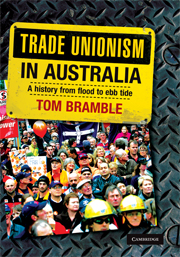Book contents
- Frontmatter
- Contents
- List of figures and tables
- List of acronyms
- Preface
- Introduction
- 1 Trade unionism in the postwar boom, 1945–67
- Part 1 The flood tide, 1968–74
- Part 2 The stand-off, 1974–83
- Part 3 The ebb tide, 1983–2007
- 5 The ALP–ACTU Accord, 1983–90
- 6 Enterprise bargaining and a revived employer offensive, 1990–96
- 7 Unionism in a cold climate, 1996–2004
- 8 WorkChoices and the defeat of the Howard Government
- 9 Results and prospects
- Notes
- Index
5 - The ALP–ACTU Accord, 1983–90
Published online by Cambridge University Press: 05 May 2010
- Frontmatter
- Contents
- List of figures and tables
- List of acronyms
- Preface
- Introduction
- 1 Trade unionism in the postwar boom, 1945–67
- Part 1 The flood tide, 1968–74
- Part 2 The stand-off, 1974–83
- Part 3 The ebb tide, 1983–2007
- 5 The ALP–ACTU Accord, 1983–90
- 6 Enterprise bargaining and a revived employer offensive, 1990–96
- 7 Unionism in a cold climate, 1996–2004
- 8 WorkChoices and the defeat of the Howard Government
- 9 Results and prospects
- Notes
- Index
Summary
Many senior union figures regard the ALP–ACTU Accord as a significant achievement. They point to the introduction of Medicare and industry superannuation, and close working relations between the ACTU and the government. They argue that the Accord was responsible for the creation of hundreds of thousands of jobs. They suggest that the Accord held at bay for 13 years the offensive that was to follow under the Howard Government. The Accord, in this view, demonstrated what could be achieved by partnership between unions and government working to advance the interests of Australian business while safeguarding the rights of workers. This chapter and the next present a rather more critical view.
The Accord marked the onset of the ebb tide in union affairs, a period of retreat that is still in progress. Whether judged in terms of working-class living standards or the vitality of the union movement, the Accord was a backward step. The regressive measures that the Fraser Government had failed to carry through were realised under the Hawke and Keating governments. Real wages fell in the 1980s despite a period of sustained economic growth, and the wages share of GDP contracted sharply as the profit share bounced back. Even the much-vaunted job creation of the 1980s gave way to large-scale job destruction in the early 1990s as the world economy went into recession. More damaging than any of these, however, was the impact the Accord had on union organisation where it really mattered – at the grassroots.
- Type
- Chapter
- Information
- Trade Unionism in AustraliaA History from Flood to Ebb Tide, pp. 125 - 158Publisher: Cambridge University PressPrint publication year: 2008



